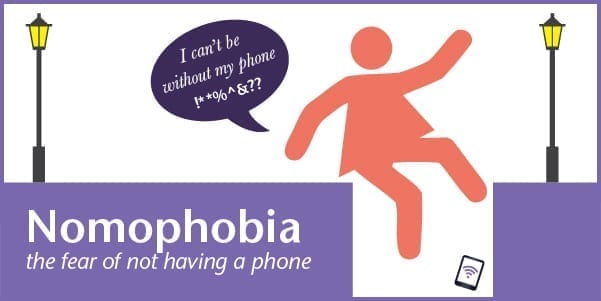Although the story of Ella Birchenough is quite an amusing one, it’s a slightly worrying indication of what we might risk to save our smartphones from any harm. Ella Birchenough was so desperate not to be without her mobile phone that after dropping it down a drain she jumped straight in to try to save it. After getting over the initial embarrassment of subsequently getting stuck and having to be rescued out of the drain, she then had to endure a period of time without her beloved phone anyway. After Ella’s rescue she still reached in again to grab it and found to her dismay that it was broken. It may have been a love of her smartphone that got her into this predicament but it was other people’s smartphones that were able to capture this moment forever. Passers by began to snap Ella in the drain on their phone cameras and instantly post them onto various social media sites for everyone to see. Her own mother’s picture of her stuck was the photograph that went viral.
Nomophobia – the fear of not having a phone
What was Ella thinking? It is likely she was suffering from No-Mobile-Phone-Phobia. Or nomophobia. A UK study in 2010 by the UK Post Office found that more people suffer from the anxiety of losing their phone than those who don’t. The anxiety comes from those thought of being unable to be in contact with friends or family or contact from work. The fear arises when a phone has been lost or forgotten, credit has run out or the battery has died. Stories about nomophobics include people taking their phones to bed with them (imagine that!), only talking to their children properly through social media sites (erm bliss) and actually much more serious ones such as using a phone whilst driving.
Are we so desperate to use our phones that we are taking serious risks with our physical safety? Research has found that, like Ella, we are so busy using our phones that we are lacking concentration when out and about – even when crossing roads. A study from the University of Washington tested 1100 people who were crossing twenty busy road junctions at various times of the day. Approximately thirty percent of road crossers were busy doing something else at the same time including listening to music, texting or talking whilst on their phone. Texting was the most risky behaviour for the participants, who took 18% longer to cross and were four times more likely to cross unsafely.
Fulfilling our need for reward – the role of dopamine
Dopamine plays a major role in reward-motivated behaviour in our brains. Any reward increases our levels of dopamine (as do some addictive drugs!). So, it’s little wonder that we seek the reinforcement we get from our hand held devices – and panic when we seem to be losing grasp of this information yielding ‘reward-centre’.
So, our phones are our lifeline
Apart from the obvious benefits of our mobile phones, we can plan our whole day using one small handset. For example, we already know what to wear because we have checked the weather and we are armed with the knowledge of the best place to meet because we have checked out the reviews. We can quickly arrange a meeting via an email – after checking our calendars to confirm if we are free of course. We could make a few calls whilst on our way or quickly text a message if we are going to be late. Not forgetting that we might want to check our social media accounts if we have a few moments spare.
What is all the worry about?
It is clear that people report feeling ‘lost’ without their mobile phone and that indeed we might be taking risks to ensure that we keep it in our possession. With everything we do and store on our phones it’s important to remember that we must also take care of the information that we store.
Tips on making phone loss less of a sudden panic!
- Always keep a password to lock your phone. You wouldn’t leave your front door unlocked or give someone your bank passcode. A phone with a passcode means you can relax a little more if you are absent from it for more than a few minutes.
- Only connect to a WiFi network that you know is safe. Turn off the feature on your phone that allows you to ‘Connect automatically to WiFi.’ Keep control of when and where you connect.
- Log out of banking apps and to be extra safe, don’t allow the phone to remember your password information.
- Never store all your codes and passwords for paypal/ banks/ amazon/ ebay on any handheld device.
So, as long as we make sure we aren’t using our phones in dangerous situations (such as when driving or crossing roads) and we have put all the provisions in place to protect them, we could start to worry less about being without it. And we should never have to attempt something as drastic as jumping into a drain to rescue one!
